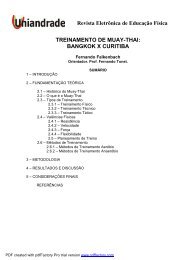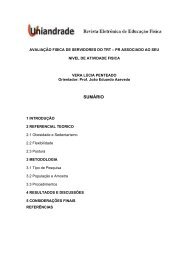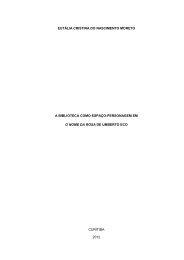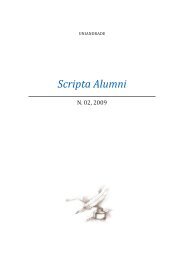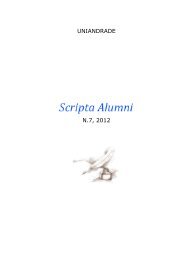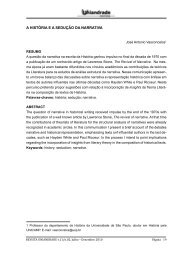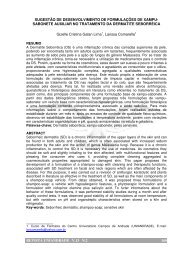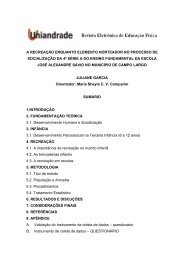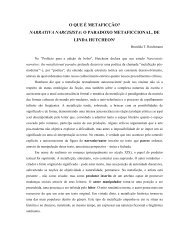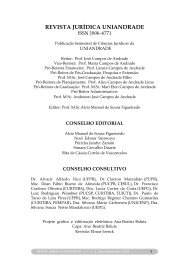Scripta 9_2_link_final.pdf - Uniandrade
Scripta 9_2_link_final.pdf - Uniandrade
Scripta 9_2_link_final.pdf - Uniandrade
Create successful ePaper yourself
Turn your PDF publications into a flip-book with our unique Google optimized e-Paper software.
‘Yea’, quoth he, ‘dost thou fall upon thy face?<br />
Thou wilt fall backward when thou hast mor wit,<br />
Wilt thou not, Jule?’ And by my holydame,<br />
The pretty wretch left crying, and said ‘Ay’. […]<br />
Lady Capulet: Enough of this, I pray thee, hold thy peace.<br />
Nurse: Yes, madam, yet I cannot choose but laugh<br />
To think it should leave crying, and say ‘Ay’;<br />
And yet I warrant it had upon its brow<br />
A bump as big as a young cockerel’s stone,<br />
A perilous knock, and it cried bitterly.<br />
‘Yea’, quoth my husband, ‘fall’st upon thy face?<br />
Thou wilt fall bakward when thou comest to age,<br />
Wilt thou not, Jule?’ It stinted, and said ‘Ay’.<br />
Juliet: And stint thou too, I pray thee, Nurse, say I. (SHAKESPEARE,<br />
2006a, p. 102)<br />
The reader/spectator who is not familiar with Romeo and Juliet tends<br />
to be surprised with the use of such language, as much as Lucia Murat’s<br />
film will startle the audience with the use of a language filled with cursing.<br />
Obviously, the environment to which Shakespeare’s play has been shifted<br />
does not allow for subtleties and the obscene language reveals itself as quite<br />
blunt. It is worth mentioning that in lieu of the romantic language found in<br />
the lovers’ dialogues in the bard’s text, the film brings movements of dance<br />
often to the sound of Prokofiev.<br />
The change in perception generates a new approach to translated<br />
literary works, leading us to understand that if a work of art is part of a<br />
tradition, it is alive and open to transformation by means of different<br />
interpretations and different intertextual dialogues, which expand into<br />
multiple readings. In a paradoxical move, the translator undresses the work<br />
of art of its sacred mantle and popularizes it, even though the removal of<br />
such mantle results precisely from the recognition of the aura of sacralization.<br />
Respect and recognition motivate the translation. The work of art loses<br />
something when it is technically produced and reproduced, but it acquires,<br />
as a consequence, the infinite places and contexts of its reproduction. And,<br />
if it loses its cult value, it acquires another function, adopting a non-specialized<br />
social practice […] (SANTIAGO, 2004, p. 114).<br />
Maré, nossa história de amor keeps its theme ties with the play which<br />
originated it, bringing traces of such precedence, even though, simultaneously,<br />
erasing them. The shifting of the previous idea implies, necessarily, forgetting,<br />
<strong>Scripta</strong> <strong>Uniandrade</strong>, v. 9, n. 2, jul.-dez. 2011 119



